Iroso Meyi (Ìrosùn Méjì)
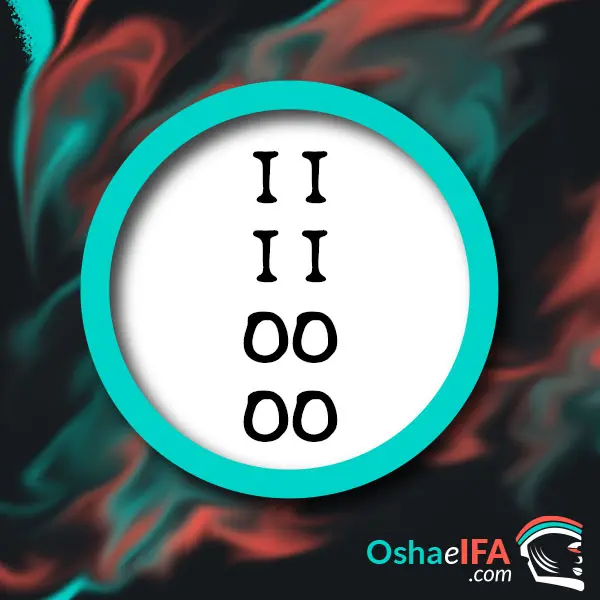
Iroso Meyi stands out as one of the 16 Meyis within the Ifá divination system, marking his presence with decidedly masculine attributes. This Odu not only symbolizes the Ifá Board, but is also enriched with gold dust in its Iyefá, representing majesty and spiritual wealth. As the son of Noni and Akasan, Ìrosùn Méjì radiates the intensity of an incandescent planet.
Symbolically, Iroso Meyi encapsulates the essence of afternoon and twilight, placing itself in the middle of the western world. The most auspicious day for him is Oye Riruriru, known as the day of confession, which falls every Wednesday. Under the rulership of Mercury, the planet Ole Agba, and associated with the metal quicksilver, Iroso Meyi favors the color canary yellow for clothing, evoking the fire that dominates and rules over all metals.
This Odu advises making sacrifices, essential to maintain balance and harmony in the lives of his followers. According to Ifá, the person under the influence of Iroso Meyi is native to Òyó, carrying with him the traditions and responsibilities that this inheritance implies.
Analysis of the Iroso Meyi sign
Iroso Meyi, marked by his depth and connection with the unknown, is an Odu of great importance within the Ifá system. It represents the sunset, the grave and the bottom of the sea, symbolizing significant transitions and profound revelations. This Odu invites his followers to contemplate the mysteries of life and the inevitability of change, highlighting the importance of spiritual and physical preparation in the face of imminent challenges.
"No one knows what is at the bottom of the sea" alludes to the unfathomable mysteries of life and human knowledge. This sign reminds us that there are always unknown elements in any situation, urging us to maintain humility and curiosity, since much of what exists remains hidden from our eyes.
Economic Aspects:
Economically, Iroso Meyi warns of difficulties and the need for constant vigilance. Financial activities under this sign can face dramatic ups and downs, requiring sacrifices and offerings to ensure stability. This Odu suggests that prosperity comes through recognition and respect for economic cycles, aligning actions with spiritual forces to avoid serious setbacks.
“Without obstacles there are no successes” suggests that challenges are essential to achieving any significant success. Ìrosùn Méjì teaches us that it is through overcoming difficulties where we truly value and learn from our achievements, strengthening our resilience and ability to face future challenges.
Health:
In health, Iroso Meyi points out the possibility of physical suffering related to vision and the nervous system, underlining the need for preventive and regular care. This Odu's connection to fire and lightning suggests a focus on stress management and emotional regulation as methods of maintaining physical well-being.
Religious Aspects:
Religiously, Iroso Meyi is an Odu that demands depth in spiritual practice. Following rituals, especially those related to Eshu and Oshún, is crucial to mitigate the adversities predicted by this sign. This Odu also emphasizes the importance of sacrifices and offerings as means to maintain harmony and divine protection.
Personal Relationships (Love):
In the area of love, Iroso Meyi suggests complexity and challenges. Relationships under this sign can be intense and deep, but also prone to misunderstandings and emotional conflicts. Honesty and open communication are essential to avoid betrayal and misunderstandings that can arise under the influence of this powerful Odu.
General Description of the Odu Iroso Meyi (Ìrosùn Méjì)
What is born in the odu of Ifá Iroso Meyi?
- The rite of Ituto.
- Sawdust (Iyé).
- The Osun tree (the spirit of Osun).
- The red came.
- The cord.
- The Pedorrea bird.
- The cardinal.
- The mortuary graves; this Odu (Iroso Meyi) commands all the holes of the earth.
- The Ashé Osun Naburuku.
- The firefly, that is, the cocuyo, which by virtue of Olofin illuminates the nights with its light.
- The Osanyin Vault.
- Raise Osun with Ifá when received.
- Cover the view of the Iyawó when they take him to the Igbodun of Osha.
What does the sign Iroso Meyi talk about?
- That this is where the trees are felled.
- That here Shango took away Osanyin's four powers.
- Of accidents.
- Of miseries.
- Of traps.
- Of sufferings; the husk is used for suffering.
- That Iroso Meyi announces both misfortune and good fortune.
- What is a strong and dangerous Ifá.
- That when it is seen in a registry, it takes peel and smears it three times on the eyelids.
- That gives men ideas and humility.
- That water does not extinguish the candle.
- The Awó that comes out of Iroso Meyi should not acquire knowledge quickly so that it does not die.
- The fury of the cemetery.
- Here Shango pointed out where the 16 positions were.
- Iroso Meyi prescribes wisdom, but everyone is watching the person.
- Which are the eyes of divine providence.
- That the person on the path of his life will always find the betrayal and traps of his enemies.
- That Babalawo Iroso Meyi must adore and obey Oshun very much and put five yellow scarves on him.
- The sight and the tear.
- That the person is having a bad life.
- That the person feels something bad in his brain that does not allow him to do good.
- That the person is not legal, he does not believe what he is told.
- Of a very envied person and that is why he has enemies.
- That the person will become well.
- That you are fighting with another person.
- That the person is visually impaired and if left unattended they may become blind.
- Very popular person and highly esteemed by his friends.
- For this sign of Ifá you should feed your head and rely on Ifá.
- To appease Osun.
- Iroso Meyi talks about financial and emotional problems.
- That to solve they always have to be making sacrifices.
- Of spiritual mass and appease his ancestor, especially his father.
The sign Iroso Meyi points out:
- Tears, this Odu's children's eyes turn red.
- Short life because Oro-Iña wonders what my son is doing up there if no one knows him, no one understands him, no one loves him. I wish to have him with me in the depths of the earth.
- War victory.
- Travel.
- Small roads, the weapons of the people.
- The haircut indicates the hierarchy.
- Dispersion of foreigners.
- Tranquility, peace and prosperity.
It may interest you: Ifa Iroso Umbo sign
Sayings of the Oddun of Ifa Iroso Meji:
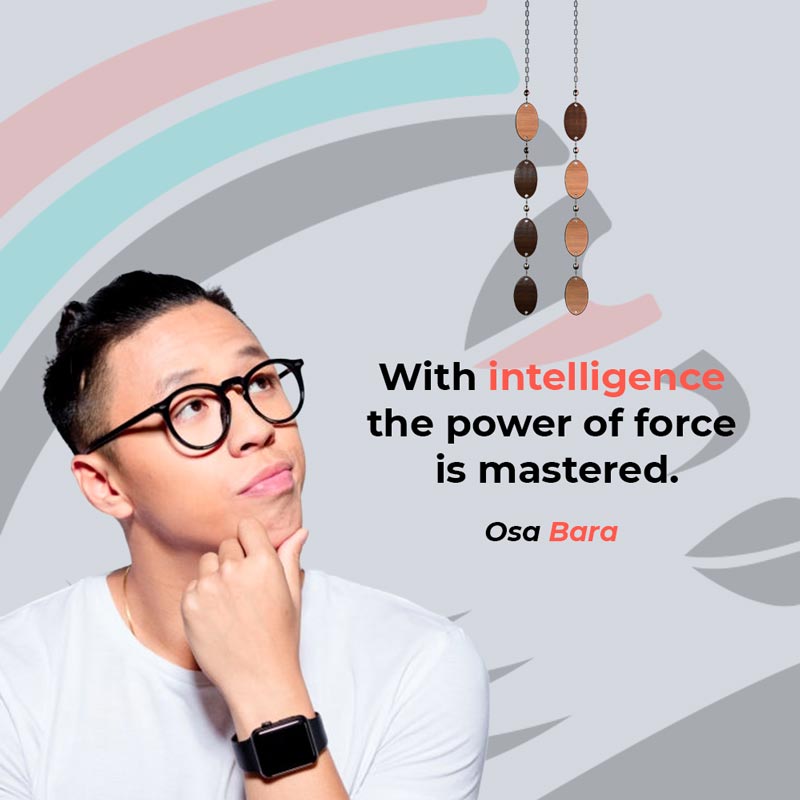
- There are those who gouge out an eye to see another blind man.
- Nobody knows what is at the bottom of the sea.
- He who gave birth straight, gave birth hunchbacked.
- Iroso Meyi is the source.
- The eyes that say that Orúnmila cannot be seen are not calm in their orbits.
- Without obstacles there are no successes.
- The things of this world are regulated when each one of them comes to an end.
- Feeding the divinity of misfortune, surely I will live in peace.
- If I complain, it will be worse for me.
- I sacrifice for Eshu and for the Elders of the Night.
- I greet the rain and the Sun when I cross my arms.
- My most important moments are the evenings at sunset.
- I have only come into the world and I will only leave, but I will regulate all the things of this world until I put an end to each one of them.
- Life should never be lived carelessly; A smile for every betrayal or deception will sweeten and lengthen life.
- No one can turn off the glowing red of the parrot feather.
- The one who can change the course of death.
- Look into your eyes and you will see the world around you in them.
- When the eagle lives, the loose canary does not reach the name of king.
- The sturdy hammer marks the floor with its head.
- The fire goes out, the Sun sets, but the red of the parrot's tail never goes out.
- He leaves the house and returns to the house.
- Shame is a great teaching.
- A woman never values a good husband until she has had to treat a second.
«Life should never be lived carelessly; A smile for every betrayal or deception will sweeten and lengthen life» teaches us about the importance of facing adversity with grace and optimism. This saying highlights that, although we cannot avoid disappointments, our attitude towards them can transform the negative experience into an opportunity to cultivate resilience and find joy even in the toughest trials.
Ifa ethical code of the odu Iroso Meji:
- The Awó takes care of his crown because he is king.
Meaning of Odu Iroso Meji:
This Odu is related to very popular people and highly esteemed by their friends. It is essential that you take care of his health, feed his mind and appease Osun, relying on Ifá and his principles.
Often, those who are ruled by this Odu feel discouraged and lose interest in their activities, so it is crucial to consult Ifá and seek calm. Iroso Meji indicates financial and emotional difficulties, but emphasizes that no matter how hard life seems, one can persevere through sacrifice and rejecting negative thoughts.
This Odu implies that things are not easy and that achieving goals requires more effort than usual. He urges deep reflection on the future, remembering that "Man proposes and God disposes."
Iroso Meyi also demands that an annual spiritual mass be performed and that ancestors, especially one's father, whether alive or deceased, be honored and worshiped.
Those born under this Odu must act without haste, with patience, and be prepared for difficult times to pass, remembering that current conditions are not permanent.
When this Odu appears in a divination for a woman eager to have a child, she is advised to make a sacrifice, since Iroso Meji predicts that she will become pregnant with a boy, who must become Babalawo.
This Odu is associated with the origin of sawdust, the Osun tree, red wine and cardón. The characteristic bird of this Odu is the Jew and it is said that salads were invented here. It talks about accidents, misery, traps and suffering, and the husk is used to alleviate these sufferings.
Iroso Meji is a dangerous Odu that can inflict severe suffering. It is also mentioned that under this sign the mortuary graves were established and it rules over all the hollows and holes of the earth.
Recommendations:
- Respect the monkey, since the Osanyin of this Ifá has a monkey's head.
- Place a small ladder inside the Ifá.
- Sleep with two lit candles for spiritual protection.
- Put gold, silver, bronze and copper coins inside the Ifá to strengthen it.
- Be careful with possible fires that can start in the kitchen.
- Thank Obatala, who favors the follower of this Odu.
- Avoid curses and spells to maintain spiritual protection.
- Do not exchange belongings with anyone to avoid losing your luck.
- Be alert for traps that could be deadly.
- Consult Ifá regularly to stay aligned with spiritual principles.
- Feed the head and rely on Ifá to strengthen the spirit and mind.
- Appease Osun to maintain balance and harmony in life.
- Perform sacrifices and offerings regularly to solve problems and maintain spiritual protection.
- Participate in spiritual masses annually and appease the ancestors, especially the father, living or dead.
Prohibitions:
- You cannot carry a knife.
- You cannot wear clothes with ovals.
- You can't go to the cemetery.
- You cannot practice rituals for Shangó or Azojuano (San Lázaro).
- It is prohibited to consume Indian bananas, apple trees, cashews, red plums, and holy lemon.
- You should not jump over holes or ditches; If necessary, it should be cleaned with a cloth before and after the jump.
- You cannot sit on bottomless chairs.
- Parrot feathers cannot be used.
- It is prohibited to drink any type of alcoholic beverages.
- Work should not be carried out jointly with another person.
- It is prohibited to allow outsiders to live in your home.
- You cannot enter a house or room first to avoid false accusations or falling into traps.
Says ifa in Iroso Meyi:
For women who want to be mothers and are eager to have children, Iroso Meyi offers clear guidance. If a woman is trying to conceive, she is advised to prepare a soup with selected leaves and the gizzard of a chicken, which will be sacrificed to Ifá. This ritual act increases the chances of pregnancy. Furthermore, if the Odu suggests the arrival of a male child, the sacrifice of a goat must be performed to ensure a successful birth and the health of the child. In cases where anxiety about offspring is prominent, offering a sheep to Ifá can be the key to starting the conception process.
Warnings are also vital in this Odu, especially in relation to personal safety. Respondents are alerted to the risk of theft, and are advised to exercise caution especially in their own homes and when avoiding potentially dangerous places. A recurring dream about a turkey and a red necklace can be a warning against possible fires in the house, potentially starting in the kitchen.
From a spiritual and grateful point of view, those ruled by Iroso Meyi must express their gratitude to Obatala and the Virgin of Monserrate, from whom they are considered to be receiving favors. Additionally, emphasis is placed on not cursing or making exchanges that could jeopardize one's luck. Visions and sensations of being in danger or being deceived are common with this Odu, so it is recommended to act with caution and follow Ifá's instructions to avoid falling into traps.
Tips from the Ifá sign Ìrosùn Méjì when appearing in divination:
When the Odu Iroso Meyi reveals himself, he brings with him specific guidance for those seeking guidance. Followers of this Odu must maintain modesty and never underestimate anyone, including friends. It is crucial to be cautious with witchcraft and it is advisable to pray the head with jicotea macho to strengthen yourself spiritually.
In the context of divination, if Iroso Meyi appears, smeared husk should be applied three times to the eyelids to relieve the pain and tears that this Odu predicts. If facing severe economic challenges or threats from enemies, it is advisable to offer significant sacrifices, such as a rooster to Eshu and two white doves to orunmila, accompanied by four yams and a sum of money, to restore prosperity and weaken adversaries.
For those in the search for love, such as a young man who is not reciprocated by a woman, it is recommended to perform specific rituals, such as sacrificing two roosters to Shango and using a white handkerchief impregnated with essences of the ritual to favorably attract the attention of the woman. Women who are being courted by multiple men should analyze carefully before making love decisions.
In terms of health and protection, it is imperative to kill a snapper on one's own head to avoid falling into traps. Furthermore, the sacrifice of a rooster, a hen, a dove, a fish, a hook and a pita to the sea will invoke the blessing of Olokun (Orisha of the depths) to bring prosperity.
It is essential to receive Olokun and offer the sacrifices prescribed by Ifá to avoid loss of vision and protect against envy, which can have disastrous consequences. Caution should be taken when entering new rooms or houses, avoiding being the first to avoid being falsely accused or falling into traps.
This Odu also instructs to avoid wakes and always maintain respect. The connection with the ancestors and sea deities is deep in this Odu, where Shangó and Oke agreed to give rise to the power of the lightning stone.
Finally, it is advised, governed by Ìrosùn Méjì, to avoid direct sunlight and campfires to prevent burns and redness. Emotional control is crucial, as this Odu predicts that betrayals and losses are common. Keeping possessions safe and relying on parental advice are best practices to preserve luck and face challenges with dignity.
In this Oddun the following Orishas speak:
Eshu, Eleniní, Ikú, Otá Olé, Shango, Olokun, Sankpana (San Lázaro), Olodumare, Orishan-nla, Oduduwa, Osun, Agayú, Yemayá, Yewá, Oshún, Ogún, Osanyin (Ozatalin) Nana Burukú, Juero, Obatalin) Nana Burukú, Juero.
Prayer of the Odu Baba Iroso Meji:
BABA IROSO MEJI OYOROSO APANTARITA BABA OYOROKO TO BEBE LOYOKUN. OLOKUN
APANTARITA BABY OYOROSO IROSO OLOKUN OSHE GBOGBO MO IYE TUTU ELEGUERE NI MEJI
KOKOLO LOSHE YEWA ORISHA SHANGO DUPUE OLORUN KOKOIBERE. MAFEREFUN OSUN, ADIFAFUN
ESHU.
Suyere Iroso Meji 4-4:
AYAGANGARA OMO LORDUMARE, AYAGANGARA OMO LORDUMARE
AIKU LOWAO OMO LORDUMARE, AYAGANGARA OMO LORDUMARE.
Eboses (Works) of the Iroso Meyi Sign:
Work for impotence:
To treat impotence, a specific combination of herbs and sacrificial elements is used. The ingredients include blood grass, stick box, tenge, jagüey, doradilla, horse stew, mastuerzo and 5 prodigiosa leaves taken from the tip of the bush. In addition, the eggs of the animals offered in sacrifice are added: a goat for Oshun, a rooster for Eshu, and a ram for Shango. These components are boiled in 6 liters of water until the volume is reduced to one liter. Once the mixture has cooled and strained, the 16 Mejis are prayed on the Ifá board. Ogunda Meji is added and Orunmila is consulted to confirm if the mixture is suitable to strengthen sexual potency. If the answer is affirmative, the ashé is added to the liter of water. The person should drink half a cup on an empty stomach and another half cup at night before going to sleep.
Ebbo (Obra) to go in Iroso Meji (4-4):
This ebbo seeks to attract good fortune (I will go). It begins with the preparation of an ointment made with corojo butter, cocoa and cascarilla. This mixture is spread on the hands while Shango is invoked. He is then prayed over Iroso Meji and four green male bananas are carefully rubbed from top to bottom, imbuing each banana with the desired intention. The bananas are then placed before Shango for six days. Finally, they are tied with a red ribbon and taken to a ceiba tree, orienting them towards the west if the intention is to attract iré. If the purpose is to prepare for a conflict or "war", the bananas are oriented towards the rising.
Patakies (stories) of the Ifa sign Iroso Meyi:
The Price of Envy
Once upon a time there were two soldiers in the court of an Obá. One of them was envious and the other, more satisfied. Every time the envious soldier asked the Obá for something, he gave him only one unit of what he asked for, while he gave the other double. The Obá knew of the former's envy and decided to play a trick.
One day, the Obá proposed to have a little fun with the two soldiers. He called them and told them that they could ask for whatever they wanted, but the envious person had to ask first. Happy for the opportunity to ask before his friend, the envious soldier devised a malicious plan. He thought that if he asked for one eye to be removed, his friend would have both eyes removed, leaving him completely blind and condemned to live in the village of the blind, where he would be the Obá.
So, in front of the Obá, he asked for his eye to be removed. The Obá, laughing, agreed and, as the envious man expected, both of his friend's eyes were gouged out.
Azojunao, upon learning what happened, informed Olofin, who immediately intervened. Olofin reprimanded the Obá and ordered that the envious soldier be brought to his presence. Olofin declared that the envious man would rule the blind people's town like a tragic Obá, while his blind friend would live at the bottom of the sea, ruling the envious man's town from a distance. The envious person would have to pay tribute to his blind friend, and if he revealed this secret, he would be blinded and locked at the bottom of the sea forever.
Explanation: This pataki teaches us the destructive consequences of envy. The envious soldier, in his desire to surpass his companion, ended up losing much more than he expected to gain. Through his actions, he brought about his own misfortune and that of his friend. Ìrosùn Méjì highlights that acts guided by envy not only harm others, but often lead to severe punishment for those who commit them. He underscores the idea that integrity and kindness are essential for fair and effective leadership, while betrayal and envy can ruin lives and communities.
The Return of Obatala
In a town governed by Obatala, the oldest and most orderly of all the inhabitants, his presence began to be questioned by the younger ones, who considered him too strict and annoying. Tired of the criticism, Obatala decided to leave to see how they would manage without him. It wasn't long before the town fell into disarray and chaos, evidencing a lack of guidance and structure.
Meanwhile, Obatala, far from the town, suffered an accident when he fell into a hole near the beach, becoming trapped between thorny guacalote branches. In the town, the young people, overwhelmed by problems and discord, mourned his departure and sought Orunmila's help to find Baba and restore order.
Orunmila, when performing a divination, was guided by Ifá to perform an Ebó near the hole on the beach. Upon depositing the Ebó, Orunmila heard Obatala's moans, found him, and with effort rescued him and cared for him until he recovered. Despite Obatala's initial resistance to return, Orunmila managed to convince him of the need for his leadership in the town.
Upon his return, Obatala was finally recognized and valued by the younger people, who humbled themselves before his wisdom and leadership, accepting that his guidance was essential for the prosperity and order of the people.
Explanation: This patakie illustrates the importance of respecting and valuing the experience and wisdom of elders. Youth can often lead to underestimating the importance of structure and experienced leadership. However, the absence of wise guidance can lead to disorganization and failure. History teaches that respect for experienced leaders and the humility to recognize their contributions are essential for common well-being.
Iroso Meji Ifa Traditional Nigerian
ÌROÙN MÉJÌ
Èjì Ìrosùn ni ò gbààwè
A dífá fun Òní
Omo Onísin ìkó ti Kólójo
Níjó tíń fomi ojúú sògbérè omo
Wón ní yóó bímo lópòlopò
Wón láyéé rè or dáá
Wón ni ire gbogbo ni ó jókòó tì í
Sùgbón kó rubo
Òní bá rbo
Ayé ye Òní
N ní wá ń jó ní wá ń yò
Níń yin àwon Babaláwo
Àwon Babaláwo ń yin Ifá
Ó ní béè làwon Babaláwo tòún wí
Èjì Ìrosùn ni ò gbààwè
A dífá fun Òní
Omo Onísin ìkó ti Kólójo
Níjó tíń fomi ojúú sògbérè omo
Wón ní yóó bímo lópòlopò
Ebo omo ni kó se
Ení ó fi Ìsín rbo
Ká ti móo pè é?
Ìyáa mòjèsín
Bàbá mojèsín
Mòjèsín ló kué délè yí bèèrè.
Iroso Meji: Ifá wishes the good fortune of children for this person. Life will please you, and your fortunes will not elude you. He must make sacrifice with many slimy snails. The woman will become the mother of young people while the man will become the father of young people.
Èjì Ìrosùn, don't run
He prophesied Ifá for Òní
The son of the Onísin clan ìkó ti Kólójo
When I cried because of the lack of children
They told him that he would have many children,
That his life would improve
And that all good things would come to him
But they advised him to offer sacrifice
It was then that Òní offered the sacrifice
Life pleased him
He began to dance happily
He was praising his Babaláwos
Their Babaláwos praised Ifá
Said it was exactly as his Babaláwos had said
Èjì Ìrosùn, don't run
He prophesied Ifá for Òní
The son of the Onísin clan ìkó ti Kólójo
When I cried because of the lack of children
They told him that he would have many children,
But I should offer the sacrifice of children
He used Ìsín (Akee apple) as a sacrifice
What do we call such a person?
Mòjèsín's mother
Mòjèsín's father
This is Mòjèsín who brought children into the world in large numbers.
Eshu of Odu Iroso Meji:
This Eshu is characterized by its mass structure and has four faces, each one associated with a blade of different material: copper, iron, steel and white metal. Inside its opening is placed a small tablet that has been washed and "eaten" with the Odu Iroso Meji, which means that it has been consecrated through specific rituals.
The charge of this Eshu is quite complex and includes various elements to enhance its strength and spiritual connection:
- Four small Ikinis, which have been washed with different types of earth.
- Four peonies and four guinea peppers.
- Four small pieces of kola nut and four kernels of roasted corn.
- Four pieces of coconut.
- Additional ingredients such as corojo butter, a specific stone whose origin must be determined through consultation, honey, cocoa butter, brandy, jutía and smoked fish.
- Sea sand, calm water from the basin, soil from the interested party's house, chicken egg, three small stones, soil from a crab cave, red clay, and jicotea shell.
- Omiero, five centavos, one realito (small value coin) and a two-cent piece.
- Earth collected from the four corners and from the door of the interested party's house, to further personalize the load.
In addition to these components, you should consult with Orúnmila to ensure that the load is complete and, if necessary, add what he indicates. It is also crucial that this Eshu receives an offering of a fresh fish as part of the sacrifice.
Learn from others Odu Meji:
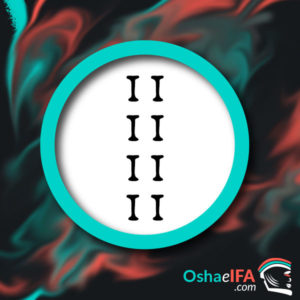



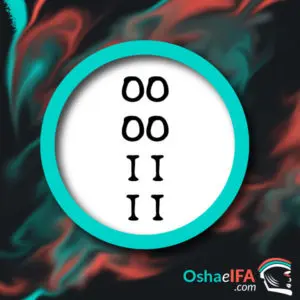
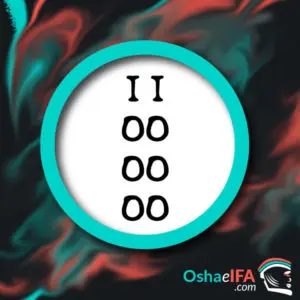
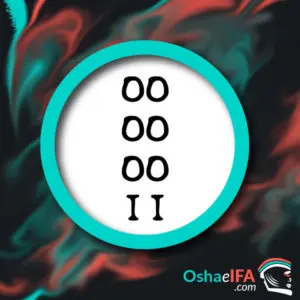
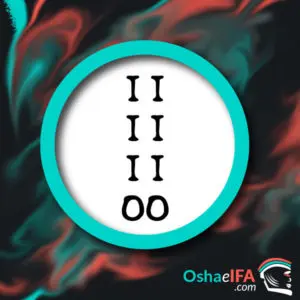
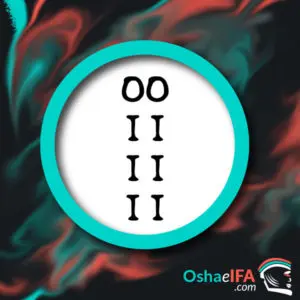
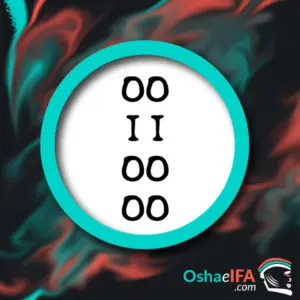
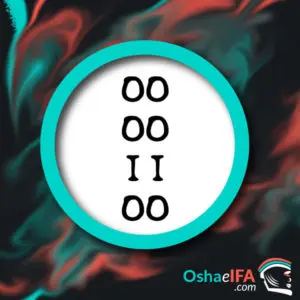
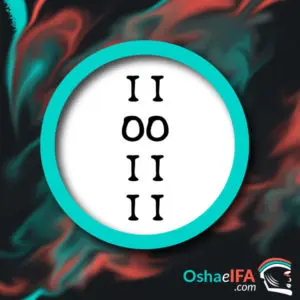
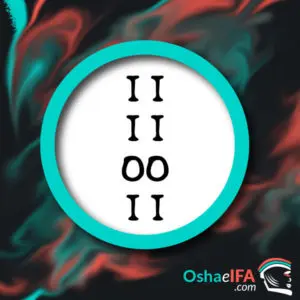
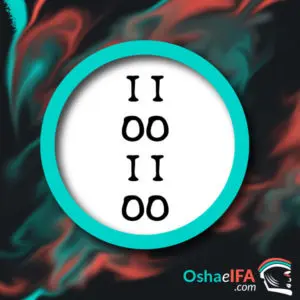
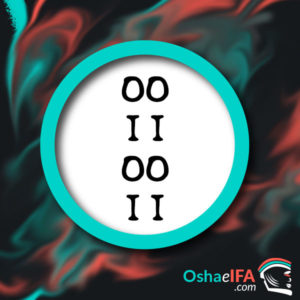
Thanks for his teachings